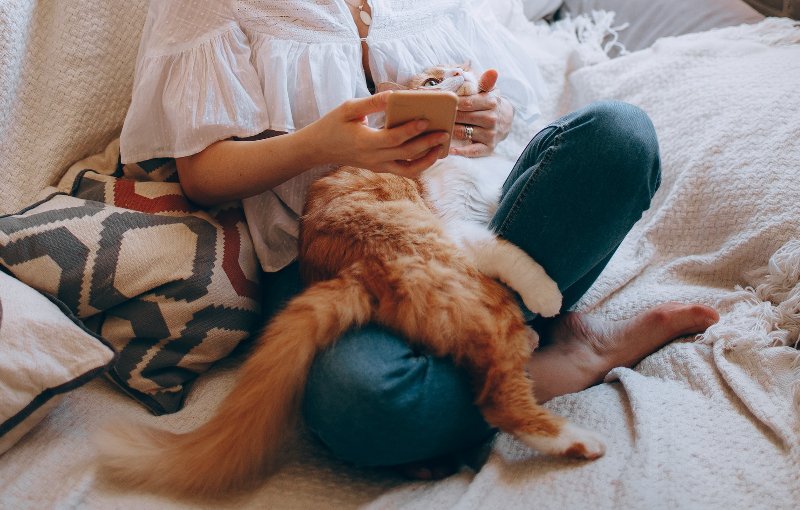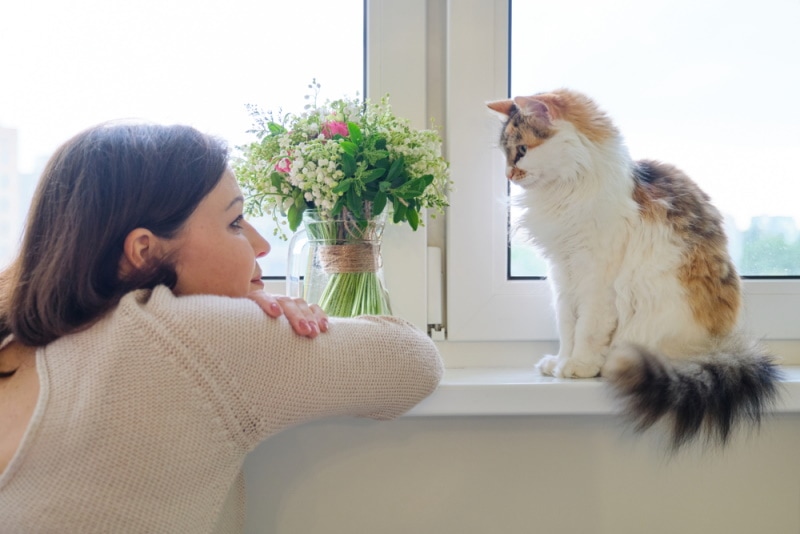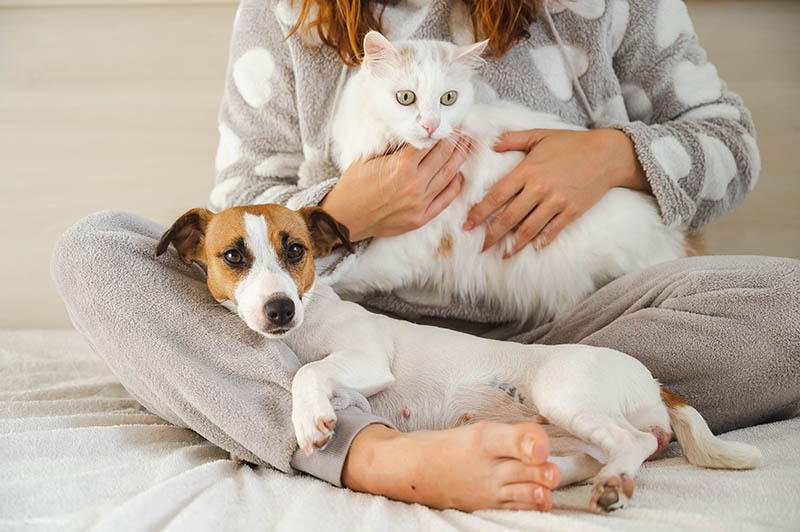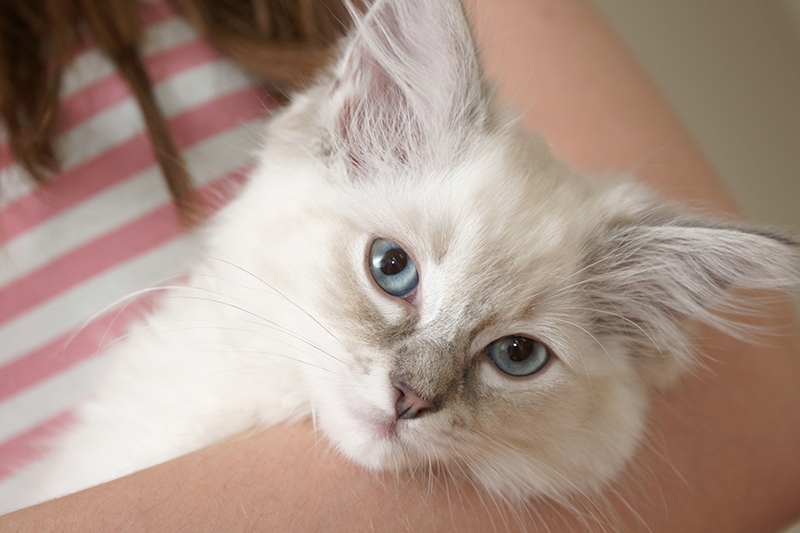Why Won’t My Cat Leave Me Alone? 7 Likely Reasons
Updated on

Most cat parents love to pamper their felines and provide them with everything that they need for maximum comfort. Although most cats are independent, they may express gratitude by coming over for sudden cuddles, which is perfectly normal.
But what happens when your cat becomes too attached to you out of the blue, especially if you’ve had them for a while and they never showcased such behavior before?
If your cat won’t leave you alone, they might be bored, hungry, or many other things. Keep reading to learn more about the possible reasons behind sudden clinginess and attachment in cats and how to help your cat overcome this problem.
The 7 Reasons Your Cat Won’t Leave You Alone
1. The Cat Suffers From Separation Anxiety
Many cats suffer from separation anxiety that can be quite severe, especially when they develop excessive attachment toward you. Signs of separation anxiety in cats1 include:
- Urinating/defecating out of the litter box
- Destroying items
- Being overly vocal
- Grooming excessively
- Seeking constant attention
Separation anxiety is common in cats, especially females, who spend most of their time indoors and don’t have contact with other pets. Cats also may experience separation anxiety when going through a change in their routine or if they have had past trauma.
If your cat is suffering from separation anxiety, there are various things that you can do to help your feline cope with these feelings, including:
- Provide more stimulating activities.
- Ignore behaviors that are attention-seeking.
- Check-in with your vet to see if your cat may need supplements or medications.
- Add relaxation exercises to your cat’s daily routine.

2. The Cat Is Hungry
One of the most common reasons that cats bug their owners is to get food. While this is somewhat normal behavior, some cats can become excessively clingy when hungry. When cats beg you for food, they’ll follow you around, rub against your legs, vocalize, or even nibble on your fingers.
If your cat is a “food beggar,” you can simply try to ignore this behavior, especially if your feline typically eats well and consumes enough nutrients in their diet. However, if this type of behavior started recently and you’ve noticed other problems, such as weight loss, it’s best to check in with your vet.
3. The Cat Is a New Member of Your Family
If you recently adopted a cat, the feline may follow you around and seem overly attached to you. Most cats are stressed and anxious when coming into a new home, which is why they can exhibit clingy behavior.
Newly adopted cats will typically hide for the first few days because everything in their environment is new, and they need time to adjust. However, they still need you there to help them through the transition and make things more comfortable for them.
Although clingy behavior and excessive attention can sometimes be overwhelming, a newly adopted cat needs extra attention during the first couple of weeks in your home.
Try your best to make your feline as comfy as possible by being there and forming a bond with them. Provide an environment where your cat can safely play and explore their new home.
As long as you are patient during this stage of your cat’s life, they’ll start to be more independent and eventually leave you alone.

4. The Cat Is Bored
Some cats need more stimulation than others and may simply follow you around and become clingy due to boredom. Many people don’t even realize that cats can get bored, and in fact, it can lead to several health problems.
Here are the most noticeable signs of boredom in felines:
- Overgrooming
- Repetitive behaviors
- Excessive attachment to you
- Fighting with other animals
- Lack of activeness and curiosity
- Overeating
If you notice any of these symptoms in your cat, the problem is likely boredom, but check in with your vet to rule out possible health problems first.
If your cat will not leave you alone out of boredom, try to enhance their environment and provide them with more activities and stimulation to keep them active and engaged. Providing things such as cat toys, high climbing spaces, and scratchers will occupy your feline and make them less attached to you.
Our Favorite Cat Toys Here are a few of our favorite cat toys, each caters to various types of play your cat might like the best.
Hepper Catnip Stick
Hepper Whale Plush
Hepper Furball Set
Contains Catnip
Safe for KIttens
Self-play
All-Natural
Washable
5. The Cat Is Experiencing Medical Issues
Some cats can become overly attached to you when they are feeling unwell, so if your cat has started to exhibit such behavior recently and won’t leave you alone, there might be a medical issue causing the behavior.
Here are common signs of illness in cats:
- Excessive attachment
- Low energy levels
- Changed body posture
- Dehydration
- Weight loss
- Low sociability
- Overgrooming/Under-grooming
If you notice any signs of illness in your cat, that’s likely why your feline won’t leave your side. It’s best to consult your veterinarian and see if your furry friend requires treatment. Many simple illnesses can lead to further health problems.

6. You’ve Moved Recently
Cats are territorial animals and like routine, which is why they can become clingy and excessively attached to you if you have gone through a recent move. Due to their nature, felines can struggle to keep up with the changes, especially in a new environment.
In the first days or even weeks after a move, many cats will change their personality as they adapt to the new home. Your feline may follow you around, meow more than usual, or simply not leave you alone.
If you’ve moved to a new place and your cat won’t leave you alone, it’s best to be patient and repeatedly assure your cat that they’re safe with you. During this period, cats can be stressed, anxious, vulnerable, and insecure, which is why it’s your duty to help them and reduce their stress levels.
7. Your Cat Has Post-Traumatic Stress Disorder
If your feline is overly attached to you and will not leave you alone, they might be suffering from post-traumatic stress disorder (PTSD). This condition is directly connected to stress, anxiety, and trauma, which is why most cats with PTSD also suffer from separation anxiety and depression.
Felines suffering from PTSD can experience an array of problems:
- Being too clingy
- Hiding more than usual
- Pacing
- Panting
- Having low activity levels
- Excessively vocalizing
- Overeating
- Undereating
- Not using the litter box
If you want to help your feline heal from past trauma and encourage them to leave you alone, you will need to dedicate the time to help your cat.
First, prepare a safe environment for the feline to relax and be comfortable. Then, help your cat try to heal by changing the trauma into a positive experience.
The recovery process can be lengthy if your cat greatly suffered in the past, but the reward will be priceless: You will have a happy, healthy cat and more free time on your hands.
Final Thoughts
If your cat will not leave you alone, try to look for other signs that might indicate what is happening with your feline. Remember to always check with your veterinarian to rule out possible health problems, and do everything in your power to help your feline if they’re going through a tough time.
Featured Image Credit By: Helena Lopes, Pexels















